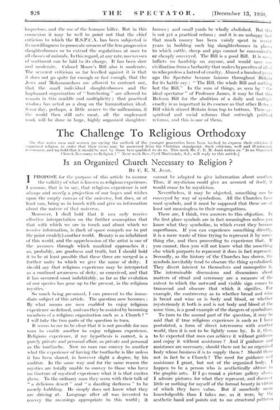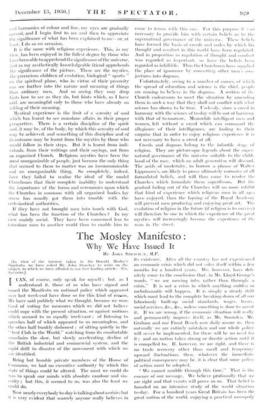The Challenge To Religious Orthodoxy
fin Ibis as series men and women pre eMing the outlook of the younger generation have been invited to express their criticism if organ ir,i1 religion in order that their views may be answered from the Christian standpoint. Such criticism, well and ilbinformol, is common, and we hold that it should be met by those best qualified to do so. This week Mr. C. E. M. Jond writes on 'Is an Organizot Church Necessary to Religion ? " Next week Rev. Cyril Martindale, will reply to this article.]
Is an Organized Church Necessary to Religion ?
BY C. E. M. Join.
T PROPOSE for the purpose of this article to assume the validity of what is known as religious experience. I assume, that is to say, that religious experience is not always and merely a .projection of our hopes and wishes upon the empty canvas of the universe, but does, or at least call, bring us in touch with and give us information about the naturc-of that universe. - Moreover, I shall hold that it can only receive effective interpretation on the further assumption that that with which we are in touch and about which we receive information, is (lack of space compels me to put the point crudely) another world. Beauty is an inhabitant of this world, and the apprehension of the artist is one of the avenues through which mankind approaches it ; so, probably-, are goodness and truth, but I should hold it to be at least possible that these three are merged in a further unity to which we give the name of deity. I should say that religious experience may be interpreted as a confused awareness of deity, so conceived, and that it has occurred most indubitably, so far as the evolution of our species has gone up to the present, in the religious mystics. •
So much being presumed, I can proceed to the imme- diate subject of this article. The question now becomes : By what means are men enabled to enjoy religious experience so defined, and can t hey be assisted by becoming members of a religious organization such as a Church ? " I will take the two parts of the question in turn.
It seems to me to be clear that it is not possible for one man to enable another to enjoy religious experience. Religious experience, if my hypothesis is correct, is a purely private and personal affair, as private and personal as I he toothache. Now no man can convey to another what the experience of having the toothache is like unless it has been shared, in however slight a degree, by his auditor. In the same way and for the same reason the mystics are totally unable to convey to those who have no tincture of mystical experience what it is that excites them. To the ordinary man they seem with their talk of "a delicious desert" and "a dazzling darkness" to be merely babbling. He simply does not know what they are driving at. Language after all was invented to convey the meanings- appropriate to this world ; it cannot be adapted to give information about another. Thus, if mysticism- could give an account of itself, it would cease to be mysticism.
Nevertheless, it may be objected, something can he conveyed by way of symibolism. All the Churches have used symbols, and it must be supposed that these are at least not meaningless to their congregations.
There are, I think, two answers to this objection. Iii the first place symbols are in fact meaningless unless you know what they symbolize, in which event they become superfluous. If you can experience something directly, it is a mere waste of time trying to represent it by some- thing else, and then proceeding to experience that. If you cannot, then you will not know what the something else which purports to represent it does in fact represent. Secondly, as the history of the Churches has shown, the symbols inevitably tend to obscure the thing symbolized. They divert interest to themselves and monopolize it. The interminable discussions and dissensions about matters of ritual and ceremony arc a measure of the extent to which the outward and visible sign comes to transcend and obscure that which it signifies. For example, the controversy as to whether bread and wine is bread and wine or is body and blood, or whether mysteriously it both is and is not body and blood at the same time, is a good example of the dangers of symbolism.
To turn to the second part of the question, it may be said that if true religious experience is such as I have postulated, a form of direct intercourse with another world, then it is not to be lightly come by. Is it, then, to be expected that men can achieve it without guidance and enjoy it without assistance ? And if guidance and assistance are necessary, should there not be an organized body whose business it is to supply them ? Should there not in fact be a Church ? The need for guidance and assistance I grant, but not of the organized body. I happen to be a person who is aesthetically obtuse to the graphic arts. If I go round a picture gallery alone, I admire pictures for what they represent, and discover little or nothing for myself of the formal beauty in virtue of which they have value. But if somebody more knowledgeable than I takes me, as it were, by the aesthetic hand and Points Ont. to me structural patterns
said harmonies of colour and line, my eyes are gradually opened, and I begin first to see and then to appreciate the significance of what has been explained to me—or, at kast, I do so on occasion.
It is the same with religious experience. This, in my view, has been enjoyed in the fullest degree by those who cc been able to apprehend the significance of the universe, just as my aesthetically knowledgeable friend apprehends the significance of the picture. These arc the mystics, the precocious children of evolution, biological " sports " cii the spiritual plane, who in virtue of their precocity f an see further into the nature and meaning of things than ordinary men. And so seeing they may drop hints how to sec as they do, but hints which, as I have said. are meaningful only to those who have already all inkling of their meaning.
Mystical experience is the fruit of a serenity of soul which has learnt to see mundane affairs in their proper perspective. There is a certain discipline of the spirit and, it may he, of the body, by which this serenity of soul may be achieved, and something of this discipline and of its outcome may be learnt from the mystics by those who would follow in their steps. But it is learnt from indi- viduals, from their writings and their sayings, not from an organized Church. Religious mystics have been the most unorgrusizable of people, just because the only thing that. seemed to them to matter was an incommunicable and an unorganizable thing. So completely, indeed, have they failed to realise the ideal of the model Churchman that their complete inability to understand the importance of the forms and ceremonies upon which the Churches its common with all organized bodies lay stress has usually got them into trouble with the ecclesiastical authorities.
If they have not brought men into touch with God, what has been the function of the Churches ? Iii my limy mainly social. They have been concerned less to introduce man to another world than to enable him to come to terms with this one. For this purposc it necessary to provide him with certain beliefs /IS to the supernatural governance of tlai universe. These belief, have formed the basis of (reeds and codes by which his thought and conduct in this world have been regulated. And in proportion as regulatiou of thought and conduct. WnS regarded as important, so have the beliefs been regarded as infallible. Thus the Churchmen have suppliol the place of ignorance by converting other men's coo- jectures into dogmas.
Unfortunately, owing to a. number or causes. of which the spread of education and science is the chief, piimile are ceasing to believe in the dogmas. A section of the Church endeavours to meet the sit nation by ameialing them in such a way that they shall it confliet with what science has shown to be true. Uselessly. since a creed in harmony with the science of to-day will be out or harmony with that of to-morrow. Meanwhile intelligent men and women, left without a creed which can command the allegiance of their intelligences, are finding to their surprise that in order to enjoy religious experienee it is not necessary to have a creed at all.
Creeds and dogmas belong to the infantile singe or religion. They are picturesque legends about the sillier- natural governance of the uuiverse suitable to the child- hood of the race, which an adult generation will discard. The acids of modernity, to borrow a phrase or Walter Lippmanics, are likely to prove ultimately come:ivy of all formulated beliefs, and will thus come to render the Churches which formulate them superfluous. But thi• gradual fading out of the Churdies will no more inhibit thal kind of experience which religious it in all a 2, • Its ye enjoyed, than the lapsing or the Royal Academy will prevent men producing and enjoying great art. Tim evolution of religion in the future or religion is to sum will therefore be one in which the experience of 1 he great mystic will increasingly beenibe the experielice of I man in the street.















































 Previous page
Previous page